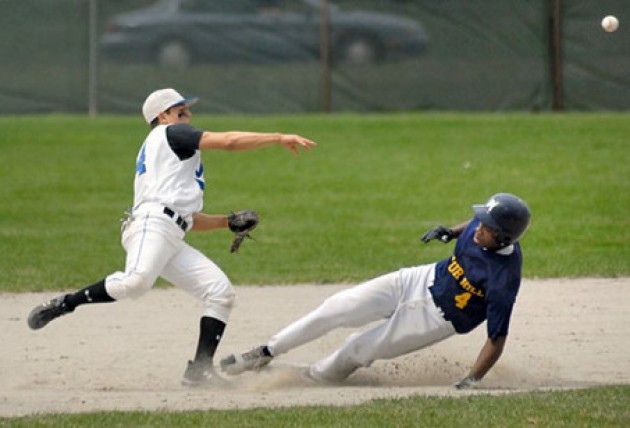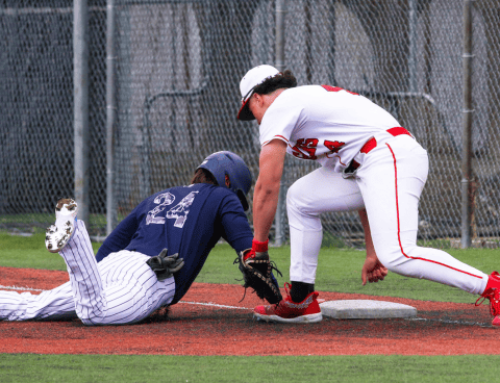
During an inning, you can go from being completely stationary to suddenly needing to perform at full speed.
Think of when you’re standing in a ready position at third base and have to sprint for home when the catcher makes an error. Or the sudden burst of energy you need to make a diving leap for the game-winning catch in the outfield.
That’s why good nutritional habits are so important for you if you’re a baseball athlete (See a baseball nutrition plan). They can help you spring into action when you need to. Poor nutritional habits can keep you from reaching your full potential on the field.
Here are a few nutrition tips that are vital for baseball players.
Fluids, Fluids and More Fluids
The most important nutrient for a baseball player is water. During workouts or practices, try to “train” yourself on how to stay properly hydrated. (See Hydration Tips for a Long Baseball Season.)
If you know it is going to be a hot and humid day, try to drink at least half your body weight in ounces of water. If you weigh 100 pounds, your goal would be 50 ounces. Dividing 50 by 8 ounces gives you 6.25. That is how many 8-ounces glasses of water you should drink that day.
Recommendations
- Drink two cups of fluid two hours before practices or games.
- Drink six to eight ounces of fluid every 15 to 20 minutes during practices or games (especially when it is hot or humid).
- Drink 24 ounces of fluid for every pound lost during practice, training or a game.
Food Can Be Your Friend
Instead of loading up on unhealthy fast food, eat balanced and nutritious meals. Fast food weighs you down and makes you feel sluggish, keeping you from performing at the top of your game. (See Attention Ballplayers: During a Doubleheader, Meals Are Twice as Important.)
Fast food simply does not provide the nutrients your body needs to stay in peak condition. Learn to make healthy decisions. Fill your plate with lots of colorful fruits and vegetables, along with plenty of whole grains. This will help meet your vitamin and mineral needs. Be consistent in your eating habits and develop a plan that will have you eating five to six healthy meals a day.
Variety
Each food group provides specific nutrients that support you in your training. Breads, whole grains, pastas and starchy veggies, provide carbs to fuel you. Meats, eggs and low-fat dairy provide protein, which prevents muscle breakdown and speeds recovery.
Remember your mother telling you to eat your fruits and veggies? She wasn’t kidding. Fruits and vegetables contain phytonutrients and antioxidants that fight free radicals that your body produces when in heavy training. They also help to combat the additional stress you put on your body in game situations.
Bottom line: Choices Can Make or Break Your Performance
Changing to a healthy eating plan can sometimes be hard. Here are some easy-to-follow meal tips.
Breakfast is probably the most important meal of the day
To jump-start your body, eat something within one hour of waking up each morning. A whole grain or wheat bagel with peanut or almond butter, a bowl of cereal with low-fat milk, eggs and toast, oatmeal or waffles with fruit toppings are all healthy choices. (See how Breakfast is Derek Jeter’s Training Secret.)
Eat healthy at lunch and dinner (especially before games)
Before a game, stick with foods that are low in fat, since foods with a high fat content stay in the stomach longer and may cause indigestion. High protein foods, that are low in fat include veal, fish, shellfish, low-fat milk and cheese, eggs, Greek yogurt, nuts, nut butters and beans. (Wonder what the pros eat? See The Ultimate Pre-Game Fueling Menu.)
Fuel with Carbohydrates
Since the body uses carbohydrates as its primary fuel source, especially during baseball, try to add a carbohydrate source (e.g., rice, pasta, bread, bagels, cereal, crackers, tortillas, fruits, veggies, sports drinks, corn and potatoes) to each meal and snack. (See Avoid an Energy Crash by Fueling With Carbohydrates.)
Although it sometimes takes time to adapt to a change in eating habits, remember that to play well, you also have to fuel your body in the right way. Along with a proper training regimen, you diet can catapult you to peak performance.
RECOMMENDED FOR YOU
MOST POPULAR

During an inning, you can go from being completely stationary to suddenly needing to perform at full speed.
Think of when you’re standing in a ready position at third base and have to sprint for home when the catcher makes an error. Or the sudden burst of energy you need to make a diving leap for the game-winning catch in the outfield.
That’s why good nutritional habits are so important for you if you’re a baseball athlete (See a baseball nutrition plan). They can help you spring into action when you need to. Poor nutritional habits can keep you from reaching your full potential on the field.
Here are a few nutrition tips that are vital for baseball players.
Fluids, Fluids and More Fluids
The most important nutrient for a baseball player is water. During workouts or practices, try to “train” yourself on how to stay properly hydrated. (See Hydration Tips for a Long Baseball Season.)
If you know it is going to be a hot and humid day, try to drink at least half your body weight in ounces of water. If you weigh 100 pounds, your goal would be 50 ounces. Dividing 50 by 8 ounces gives you 6.25. That is how many 8-ounces glasses of water you should drink that day.
Recommendations
- Drink two cups of fluid two hours before practices or games.
- Drink six to eight ounces of fluid every 15 to 20 minutes during practices or games (especially when it is hot or humid).
- Drink 24 ounces of fluid for every pound lost during practice, training or a game.
Food Can Be Your Friend
Instead of loading up on unhealthy fast food, eat balanced and nutritious meals. Fast food weighs you down and makes you feel sluggish, keeping you from performing at the top of your game. (See Attention Ballplayers: During a Doubleheader, Meals Are Twice as Important.)
Fast food simply does not provide the nutrients your body needs to stay in peak condition. Learn to make healthy decisions. Fill your plate with lots of colorful fruits and vegetables, along with plenty of whole grains. This will help meet your vitamin and mineral needs. Be consistent in your eating habits and develop a plan that will have you eating five to six healthy meals a day.
Variety
Each food group provides specific nutrients that support you in your training. Breads, whole grains, pastas and starchy veggies, provide carbs to fuel you. Meats, eggs and low-fat dairy provide protein, which prevents muscle breakdown and speeds recovery.
Remember your mother telling you to eat your fruits and veggies? She wasn’t kidding. Fruits and vegetables contain phytonutrients and antioxidants that fight free radicals that your body produces when in heavy training. They also help to combat the additional stress you put on your body in game situations.
Bottom line: Choices Can Make or Break Your Performance
Changing to a healthy eating plan can sometimes be hard. Here are some easy-to-follow meal tips.
Breakfast is probably the most important meal of the day
To jump-start your body, eat something within one hour of waking up each morning. A whole grain or wheat bagel with peanut or almond butter, a bowl of cereal with low-fat milk, eggs and toast, oatmeal or waffles with fruit toppings are all healthy choices. (See how Breakfast is Derek Jeter’s Training Secret.)
Eat healthy at lunch and dinner (especially before games)
Before a game, stick with foods that are low in fat, since foods with a high fat content stay in the stomach longer and may cause indigestion. High protein foods, that are low in fat include veal, fish, shellfish, low-fat milk and cheese, eggs, Greek yogurt, nuts, nut butters and beans. (Wonder what the pros eat? See The Ultimate Pre-Game Fueling Menu.)
Fuel with Carbohydrates
Since the body uses carbohydrates as its primary fuel source, especially during baseball, try to add a carbohydrate source (e.g., rice, pasta, bread, bagels, cereal, crackers, tortillas, fruits, veggies, sports drinks, corn and potatoes) to each meal and snack. (See Avoid an Energy Crash by Fueling With Carbohydrates.)
Although it sometimes takes time to adapt to a change in eating habits, remember that to play well, you also have to fuel your body in the right way. Along with a proper training regimen, you diet can catapult you to peak performance.











